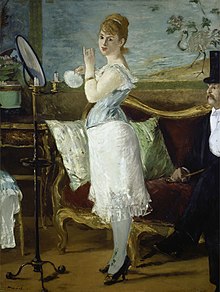Nana (novel)

Édouard Manet, Nana, 1877
|
|
| Author | Émile Zola |
|---|---|
| Country | France |
| Language | French |
| Series | Les Rougon-Macquart |
| Genre | Novel |
|
Publication date
|
1880 |
| Media type | Print (Serial, Hardback & Paperback) |
| Preceded by | Une Page d'amour |
| Followed by | Pot-Bouille |
Nana is a novel by the French naturalist author Émile Zola. Completed in 1880, Nana is the ninth installment in the 20-volume Les Rougon-Macquart series.
A year before he started to write Nana, Zola knew nothing about the Théâtre des Variétés. Ludovic Halévy invited him to attend an operetta with him there on February 15, 1878, and took him backstage. Halévy told him innumerable stories about the amorous life of the star, Anna Judic, whose ménage à trois served as the model for the relationships of Rose Mignon, her husband, and Steiner in Zola's novel. Halévy also provided Zola with stories about such famous prostitutes such as Blanche d'Antigny, Anna Deslions, Delphine de Lizy, and Hortense Schneider, upon which Zola drew in developing the character of his title character.
Nana tells the story of Nana Coupeau's rise from streetwalker to high-class prostitute during the last three years of the French Second Empire. Nana first appeared near the end of Zola's earlier novel Rougon-Macquart series, L'Assommoir (1877), where she is the daughter of an abusive drunk. At the conclusion of that novel, she is living in the streets and just beginning a life of prostitution.
Nana opens with a night at the Théâtre des Variétés in April 1867 just after the Exposition Universelle has opened. Nana is eighteen years old, though she would have been fifteen according to the family tree of the Rougon-Macquarts Zola had published years before starting work on this novel. Zola describes in detail the performance of La blonde Vénus, a fictional operetta modeled after Offenbach's La belle Hélène, in which Nana is cast as the lead. All of Paris is talking about her, though this is her first stage appearance. When asked to say something about her talents, Bordenave, the manager of the theatre, explains that a star does not need to know how to sing or act: "Nana has something else, dammit, and something that takes the place of everything else. I scented it out, and it smells damnably strong in her, or else I lost my sense of smell." Just as the crowd is about to dismiss her performance as terrible, young Georges Hugon shouts: "Très chic!" From then on, she owns the audience. Zola describes her appearance only thinly veiled in the third act: "All of a sudden, in the good-natured child the woman stood revealed, a disturbing woman with all the impulsive madness of her sex, opening the gates of the unknown world of desire. Nana was still smiling, but with the deadly smile of a man-eater."
...
Wikipedia
